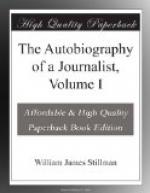In all these years, whether in the wilderness or in the city, I lived a life more or less visionary, and absorbed in mental problems, in the solution of which I passed days of intense thought, and, when no solution appeared to my unaided reason, I used to fast until the solution appeared clear, which was often not until after days of entire abstinence from food of any kind,—the fast lasting occasionally three days,—by which time the diminishing mental energy brought with it a diminution of the perplexity, and I came out of the morbid state in which I had been, and probably found that there was generally an intellectual delusion in the problem. I do not remember the particular character of these perplexities, save that they were generally questions of right and wrong in motive or conduct; but, from the fact that they did not leave a permanent impression, I suppose they were of the quisquilioe which seem at times to perplex the theological world, the stuff that dreams are made of. Up to this time all the doctrines of my early creed held me in bondage: the observance of the Seventh-Day Sabbath, and the exigencies of the letter of the law, which entirely hid the worth of its spirit, were imperative on me, and out of the complication I derived little happiness and much distress. This kind of Christianity seems to me now of the nature of those burdens which the Pharisees of old laid on the consciences of their day, and it was only years later than the time I am here writing of, when I finally moved to Cambridge and came under the influence of the broadest form of Christianity, that they were removed. I owe it to one of the truest friends of my early manhood,—Charles Eliot Norton, the friend as well of Emerson, Lowell, and Longfellow,—that the real nature of these questions of formal morality was finally made clear to me, and life made a relatively simple matter.
This is an anticipation of the sequence of my development, and given here not to leave occasion to recur to the subject again. On my return from the first summer in the Wilderness, I took a studio again in New York, and entered more formally into the fellowship of the painters of landscape. Being under no necessity of making the occupation pay, I probably profited less than I ought by the regime, and followed my mission of art reformer as much by a literary propaganda as by example. This, as all know who have ventured it, was more or less the effectual obstacle to practical attainment in art.




